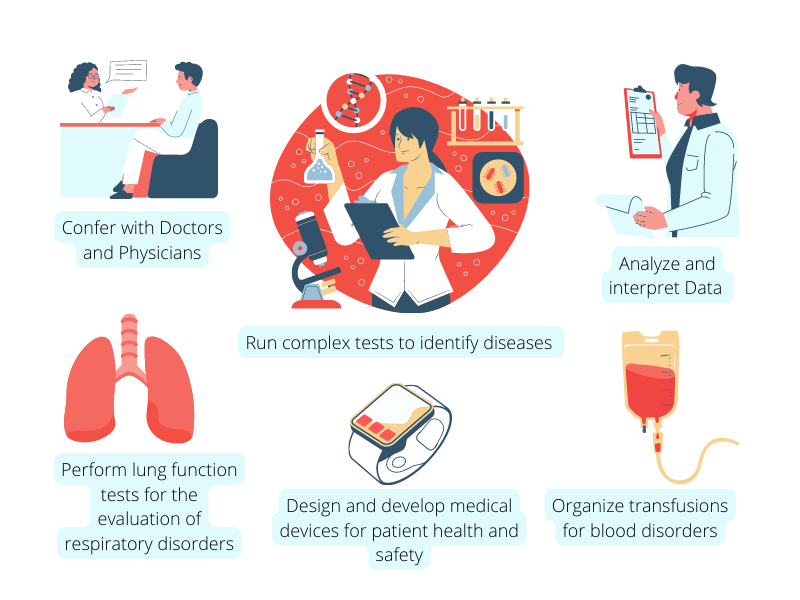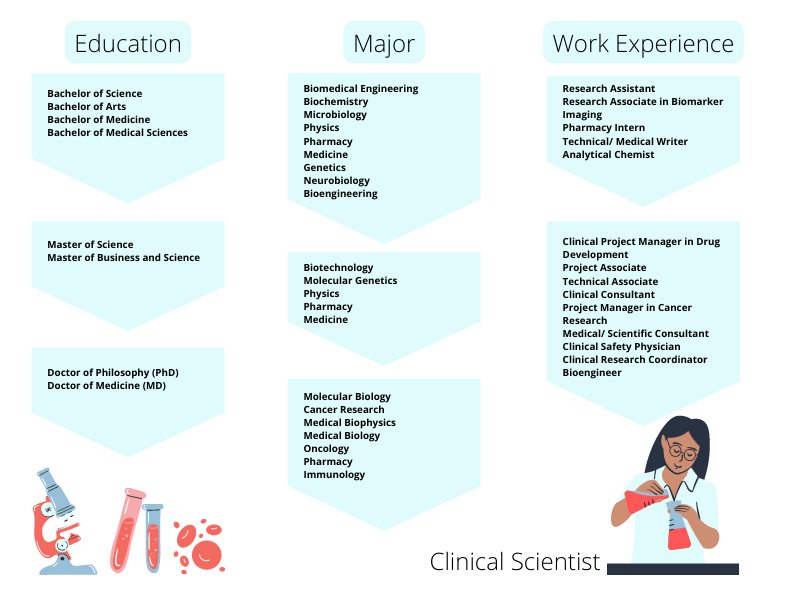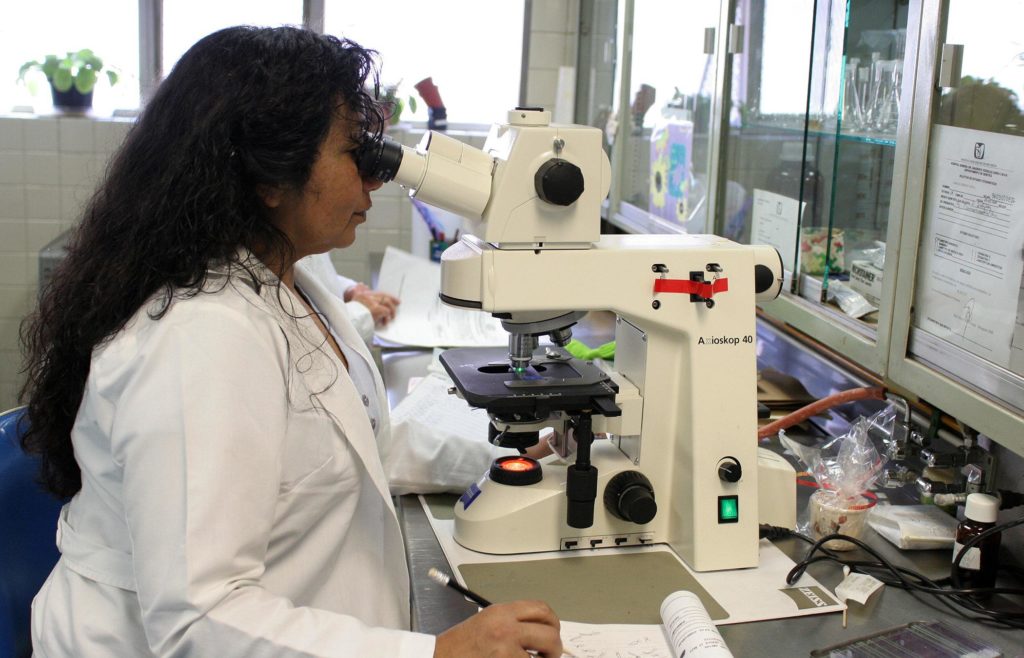Do you possess laboratory skills, an analytical mindset and a penchant for research? If you enjoy working with biological samples and are enthusiastic about healthcare, a career as a clinical scientist might be just right for you.
To start applying to clinical scientist jobs today, head over to the Xtalks Job Search platform.
The Role of a Clinical Scientist
A clinical scientist conducts research to help prevent illness and develops techniques to support patient diagnosis and treatment. They will often find themselves working in a healthcare or pharmaceutical field that supports human health research.
A clinical scientist runs experiments on biological samples — cells, tissues, blood and body fluids to identify infections and biomarkers. Their work might involve matching blood samples for transfusions. They also assist in the testing of medical devices and development of drug products. Doctors and physicians rely on the results provided by a clinical scientist to make an accurate prognosis, diagnosis and assessment for a patient’s treatment plan.
What is it Like to Work as a Clinical Scientist?
This role is often synonymous with:
- Clinical Research / Clinical Laboratory Scientist
- Medical / Biomedical Scientist
- Clinical Research Investigator
- Medical Technologist
In addition to laboratory responsibilities, this role may come with supervisory and administrative duties. Some clinical scientists may assume additional roles in quality assurance, liaising, teaching and management.
Depending on the type of field or company, you can pursue clinical scientist jobs with a major in biology, medicine, medical technology, chemistry, immunology and other related life science and pre-medical degrees. A clinical scientist can work in private or public sectors: hospitals, clinics, laboratories, pharmaceutical and medical device companies, government and educational institutions and so on.
What Will You Do as a Clinical Scientist?
As a clinical scientist, you would be responsible for bringing laboratory discoveries into clinical implementation.

Here is a summary of the kind of work you can expect to do:
- Design and implement clinical trials for human diseases and treatment
- Perform diagnostics using equipment and run testing on medical devices
- Liaise with stakeholders and scientists
- Participate in departmental and investigator meetings and be involved in decision-making
- Mentor and train fellow scientists
- Test patient biological samples like cells, tissues, blood and body fluids
- Interpret medical tests and confer with doctors and physicians for a suitable prognosis and treatment plan
As a clinical scientist, you will play an important role in supporting doctors and physicians. Being conceptually strong and having demonstrated experience in a clinical research environment or relevant skills that can be applied to a clinical research environment will serve you well. In addition, strong mathematical and analytical skills will strengthen your profile as clinical scientist.
What Field Can You Work in as a Clinical Scientist?
There are different fields to explore — these include clinical bioinformatics, physiological sciences, pathology, medical physics and more.
Below is a brief preview from the National Health Services’ list of healthcare science fields:
- Vascular Science
- Respiratory Physiology
- Clinical Pharmaceutical Science
- Rehabilitation Engineering
- Radiotherapy Physics
- Ultrasound and non-ionizing radiation
- Blood transfusion
- Microbiology
- Hematology
- Genetic Science
- Genomics
- Computer Science and Modeling
What Do You Need to be a Clinical Scientist?
Qualifications
The minimum educational requirement to pursue this role is a bachelor’s degree. You can either work your way up gathering research experience, technical skills or you can pursue a graduate or a postgraduate degree. However, as is the case with many research-intensive roles, you may have better chances of securing this position if you complete a master’s degree or a PhD in the life sciences or a medical degree. In addition, some clinical scientist jobs require you to be licensed or certified. No matter where you start and how different your skillset might be, gathering clinical research experience along the way will help you towards your goal.
A Sample Trend of How Life Science Professionals Arrived at the Clinical Scientist Role:
The educational background of a clinical scientist can involve:

Certifications
In most US states, you need certification to work as a clinical scientist or a medical laboratory technologist. This can involve passing an exam or attaining some form of licensure online. These specializations are readily available online from universities and accredited organizations.
In the US, you can gain these certifications or licenses from:
- The American Society for Clinical Pathology (ASCP)
- The Association of Clinical Research Professionals (ACRP)
Becoming a Certified Clinical Research Professional (CCRP) or a Clinical Trial Investigator (CTI) will also add to your mettle as a clinical scientist. In Canada, you can get certified as a Medical Laboratory Technologist from the Canadian Society for Medical Laboratory Science (CSMLS).
If you have your heart set on being a clinical or a medical scientist early on, you can browse for university programs that support this ambition. The Penn State College of Medicine in Pennsylvania, US offers a Medical Scientist Training Program for would-be physician-scientists. In addition, some universities like the John Hopkins Bloomberg School of Public Health in Maryland, US offer graduate training programs in Clinical Investigation for up-and-coming clinical scientists. In Canada, the University of Toronto offers a PhD program called the Clinician Scientist Training Program.
Soft skills
As a clinical scientist, you will need to be comfortable:
- Working in a high-pressure environment
- Multi-tasking between wet lab and analytical desk work
- Working for long hours and on your feet
- Supervising and training members as required
- Communicating and presenting scientific data to doctors and physicians
What is the Salary Like for a Clinical Scientist?
The clinical scientist salary ranges widely, which indicates that pay could be indicative of experience and there are plenty of opportunities to learn and succeed in this role. The US Bureau of Labor Statistics reported the 2021 median pay for a medical scientist to be $95,310 a year. A medical microbiologist, also sometimes classified as a medical scientist, earned a median annual income of $79,260 in 2021. On the other hand, a clinical laboratory technologist received a median annual pay of $57,800 in 2021. In Canada, the median wage per hour for a medical laboratory technologist is between $22.35 and $34.25.
What Does the Future Look Like for a Clinical Scientist?
The US Bureau of Labor Statistics projects the medical scientist role to grow by 17 percent between 2020 and 2030. In addition, an average of 12,600 openings are predicted for this role per year. They also surmised that the clinical laboratory technologist role would grow by 11 percent between 2020 and 2030 and job seekers might see an average of 25,900 openings per year for this role.
So Why Should You Become a Clinical Scientist?
A career in clinical research is intense and exhausting, but it is also exciting and interesting. The work of a clinical scientist goes hand in hand with clinical advancement. You will not only research something new on a regular basis, but also contribute directly to patient care.
Bear in mind that there isn’t a straight line towards the clinical scientist role. Some people spend a few years in associate roles or a combination thereof and not all of them possess a postdoctoral degree. You can do some preliminary searching by hopping onto LinkedIn and browsing people’s career trajectory. This will give you some insight into the varied backgrounds that make for a clinical scientist.
If you are just starting out, go online and read up as much as you can on what it takes and what you need to do to get a foothold. Understand the versatility of this role and inspect the different routes that you can take and the different areas you can contribute to. If you are currently pursuing an undergraduate or a graduate degree, enroll in courses that encourage laboratory work. Ensure that the certification or degree course that you pursue includes elements that add some real-world value towards your job search or skillset. Reach out to people who are currently working as clinical scientists and get a feel for their daily lives and what excites them about their job. Find a mentor that can guide you and finally, don’t hesitate to ask the question — is this right for me?
You can start applying to clinical scientist jobs today by visiting Xtalks Job Search, which features exciting new openings in the pharma, biotech and medical device industries.












Join or login to leave a comment
JOIN LOGIN